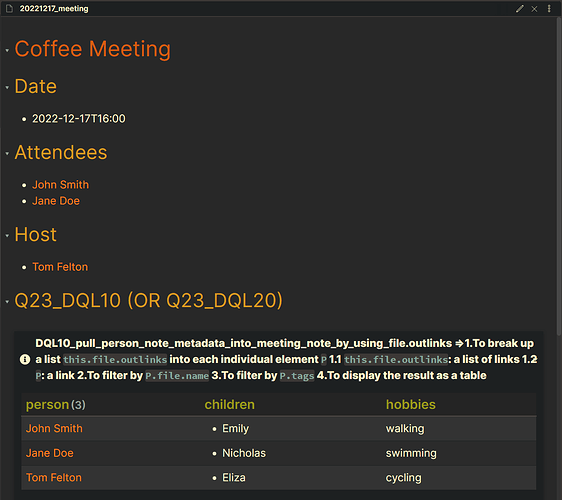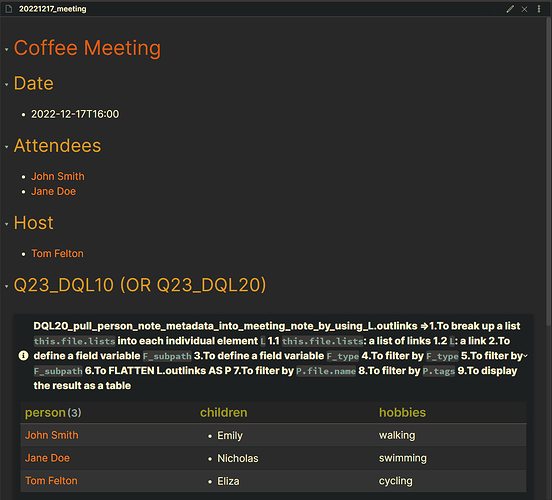Topic
Summary
- How to pull the ‘person note’ metadata into a ‘meeting note’ via Dataview DQL query?
Test
Summary
- dataview: v0.5.55
Input
Summary
the current note
- Location: “100_Project/02_dataview/Q23_meeting/Q23_test_data”
folder: Meeting
- filename :
20221217_meeting
```md
## Coffee Meeting
### Date
- 2022-12-17T16:00
### Attendees
- [[John Smith]]
- [[Jane Doe]]
### Host
- [[Tom Felton]]
### Q23_DQL10 (OR Q23_DQL20)
```
dictionary files
- Location: “100_Project/02_dataview/Q23_meeting/Q23_test_data”
folder: Persons
- filename :
Jane Doe
```yaml
---
tags: [ person ]
children: [ "Nicholas" ]
---
hobbies:: swimming
```
- filename :
John Smith
```yaml
---
tags: [ person ]
children: [ "Emily" ]
---
hobbies:: walking
```
- filename :
Tom Felton
```yaml
---
tags: [ person ]
children: [ "Eliza" ]
---
hobbies:: cycling
```
DQL10_pull_person_note_metadata_into_meeting_note_by_using_file.outlinks
Summary
Main DQL
| Code Name | Data type | Group By | Purposes | Remark |
|---|---|---|---|---|
| DQL10 _pull_person_note_metadata _into_meeting_note _by_using_file.outlinks |
(Meeting notes)this.file.outlinks:a list of links (Person notes) tags:a list of strings |
no | 1.To break up a list this.file.outlinks into each individual element P 1.1 this.file.outlinks: a list of links 1.2 P: a link 2.To filter by P.file.name 3.To filter by P.tags 4.To display the result as a table |
Code DQL10_pull_person_note_metadata_into_meeting_note_by_using_file.outlinks
Summary_code
title: DQL10_pull_person_note_metadata_into_meeting_note_by_using_file.outlinks =>1.To break up a list `this.file.outlinks` into each individual element `P` 1.1 `this.file.outlinks`: a list of links 1.2 `P`: a link 2.To filter by `P.file.name` 3.To filter by `P.tags` 4.To display the result as a table
collapse: close
icon:
color:
```dataview
TABLE WITHOUT ID
P AS "person",
P.children AS "children",
P.hobbies AS "hobbies"
FROM "100_Project/02_dataview/Q23_meeting/Q23_test_data/Meeting/20221217_meeting.md"
FLATTEN this.file.outlinks AS P
WHERE !contains(P.file.name, "Template")
WHERE contains(P.tags, "person")
```
Screenshots(DQL10): using file.outlinks
DQL20_pull_person_note_metadata_into_meeting_note_by_using_L.outlinks
Summary
Main DQL
| Code Name | Data type | Group By | Purposes | Remark |
|---|---|---|---|---|
| DQL20 _pull_person_note_metadata _into_meeting_note _by_using_L.outlinks |
(Meeting notes)L.outlinks:a list of links (Person notes) tags:a list of strings |
no | 1.To break up a list this.file.lists into each individual element L 1.1 this.file.lists: a list of links 1.2 L: a link2.To define a field variable F_subpath 3.To define a field variable F_type 4.To filter by F_type 5.To filter by F_subpath 6.To FLATTEN L.outlinks AS P 7.To filter by P.file.name 8.To filter by P.tags 9.To display the result as a table |
Code DQL20_pull_person_note_metadata_into_meeting_note_by_using_L.outlinks
Summary_code
title: DQL20_pull_person_note_metadata_into_meeting_note_by_using_L.outlinks =>1.To break up a list `this.file.lists` into each individual element `L` 1.1 `this.file.lists`: a list of links 1.2 `L`: a link 2.To define a field variable `F_subpath` 3.To define a field variable `F_type` 4.To filter by `F_type` 5.To filter by `F_subpath` 6.To FLATTEN L.outlinks AS P 7.To filter by `P.file.name` 8.To filter by `P.tags` 9.To display the result as a table
collapse: close
icon:
color:
```dataview
TABLE WITHOUT ID
P AS "person",
P.children AS "children",
P.hobbies AS "hobbies"
FROM "100_Project/02_dataview/Q23_meeting/Q23_test_data/Meeting/20221217_meeting.md"
FLATTEN this.file.lists AS L
FLATTEN meta(L.header).subpath AS F_subpath
FLATTEN meta(L.header).type AS F_type
WHERE F_type = "header"
WHERE F_subpath = "Attendees" OR F_subpath = "Host"
FLATTEN L.outlinks AS P
WHERE !contains(P.file.name, "Template")
WHERE contains(P.tags, "person")
```

